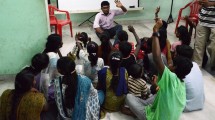Abstract
Collaboration between international development NGOs and Africa’s national knowledge institutes, particularly universities, is receiving increasing support from global policy-makers and donor agencies. In spite of this, little is reported about the practice of such collaboration. This paper helps fill this lack of knowledge. It shares findings from a research project by a consortium of four international NGOs exploring the potential for collaboration with knowledge institutes in Burundi, DR Congo, Liberia, South Sudan, Sudan, and Uganda. The findings are based on analysis of interviews with NGO managers in these countries and on subsequent interviews by these NGO managers of staff in national knowledge institutes. The views of the NGO managers regarding collaboration lean towards scepticism, in keeping with the limited literature on the matter. However, after interviewing staff in the knowledge institutes, the NGO managers did find potential for collaboration based on personal relations and meeting both parties’ more immediate interests.
Similar content being viewed by others
References
Aniekwe, C. C., Hayman, R., Mdee, A., Akuni, J., Lall, P., and Stevens, D. (2012) Academic-NGO Collaboration in International Development Research: A Reflection on the Issues, London: INTRAC.
Collins, C. S. (2011) Higher education and global poverty. University partnerships and the World Bank in developing countries, Amherst: Cambria Press.
Dutch Consortium for Rehabilitation (2011) Learning Agenda (DCR Ed. Vol. 2015), Apeldoorn: DCR.
Hayman, R. (2012). Promoting academic-practitioner partnerships in international development research. Oxford: INTRAC. Retrieved from http://www.intrac.org/data/files/resources/749/Cracking-Collaboration_Briefing-note_31-Aug.pdf
Jowi, J. O. (2012) ‘African universities in the global knowledge economy: the good and ugly of internationalization’, Journal of Marketing for Higher Education 22(1): 153–165.
Kinser, K., and Green, M. F. (2009) The Power of Partnerships: A Transatlantic Dialogue, Washington DC: American Council on Education.
Kot, F. C. (2015) ‘The perceived benefits of International Partnerships in Africa: A Case Study of Two Public Universities in Tanzania and the Democratic Republic of Congo’, Higher Education Policy 29(1): 41–62; advance online publication 3 March 2015. doi:10.1057/hep.2015.2
KTNet Africa. (2014). Knowledge Translation Network Africa. Supporting translation of health systems evidence into policy & acvtion across Sub-Saharan Africa. Retrieved 6 January, 2016, from http://ktnetafrica.net/
Lewis, D., and Opoku‐Mensah, P. (2006) ‘Moving forward research agendas on international NGOs: theory, agency and context’, Journal of International Development 18(5): 665–675.
Magara, E. (2009) ‘Financing a Public University: Strategic Directions for Makerere University in Uganda’, Journal of Higher Education in Africa 7(3): 61–86.
Mamdani, M. (2007) Scholars in the Marketplace: The Dilemmas of Neo-Liberal Reform at Makerere University, 1989–2005, Dakar: CODESRIA.
Mamdani, M. (2011) ‘The importance of research in a university’, Pambazuka News 526(21): 1–8.
Ndirangu, M., and Udoto, M. O. (2011) ‘Quality of learning facilities and learning environment: Challenges for teaching and learning in Kenya’s public universities’, Quality Assurance in Education 19(3): 208–223.
Neave, G. (2003) ‘Africa: things fall apart?’, Higher Education Policy 16(3): 255–258.
Oanda, I., and Khelfaoui, H. (2011) ‘Academic Freedom in Africa; Between Local Powers and international Donors’, Journal of Higher Education in Africa 1 & 2: 5–13.
Obamba, M. O. (2013a) ‘Transnational knowledge partnerships: new calculus and politics in Africa’s development’, Compare: A Journal of Comparative and International Education 43(1): 124–145.
Obamba, M. O. (2013b) ‘Uncommon knowledge: World bank Policy and the unmaking of the knowledge Economy in Africa’, Higher Education Policy 26(1): 83–108.
Obamba, M. O., and Mwema, J. K. (2009) ‘Symmetry and asymmetry: New contours, paradigms, and politics in African academic partnerships’, Higher Education Policy 22(3): 349–371.
Ogachi, I. O. (2011) ‘Neo-liberalism and the Subversion of Academic Freedom from Within: Money, corporate cultures and ‘captured’ intellectuals in African Public Universities’, Journal of Higher Education in Africa 9(1&2): 25–47.
Roper, L. (2002) ‘Achieving successful academic-practitioner research collaborations’, Development in Practice 12(3–4): 338–345.
Samoff, J., and Carroll, B. (2004) ‘The promise of partnership and continuities of dependence; external support to higher education in Africa’, African Studies Review 47(1): 67–199.
Sawyerr, A. (2004) ‘Challenges facing African universities: selected issues’, African Studies Review: 1–59.
Stevens, D., Hayman, R., and Mdee, A. (2013) ‘Cracking collaboration’ between NGOs and academics in development research’, Development in Practice 23(8): 1071–1077.
Sullivan, H., and Skelcher, C. (2002) Working Across Boundaries: Collaboration in Public Services, London: Palgrave Macmillan.
SUNRAY. (2015). Sustainable Nutrition Research for Africa in the Years to come. Retrieved 6 January, 2016, from http://sunrayafrica.co.za/sunray_cms/index.php?frontend_action=display_compound_text_content&item_id=1079
Wordofa, K. H. (2014) `Adoption of Web 2.0 in academic libraries of top African universities’, The Electronic Library 32(2): 262–277.
World Bank. (2011). Knowledge for development (K4D) website. Retrieved 7 August, 2015, from http://web.worldbank.org/WBSITE/EXTERNAL/WBI/WBIPROGRAMS/KFDLP/0,contentMDK:20269141~menuPK:461231~pagePK:64156158~piPK:64152884~theSitePK:461198,00.html
Acknowledgments
Gerard Prinsen is also an external adviser to the Dutch Consortium for Rehabilitation (DCR).
Author information
Authors and Affiliations
Corresponding author
Rights and permissions
About this article
Cite this article
Prinsen, G., Hartog, I. & Vink, M. “It Would be Great to See an Example…” Collaboration Between International NGOs and National Knowledge Institutes in Six African Countries. High Educ Policy 30, 203–223 (2017). https://doi.org/10.1057/s41307-016-0006-8
Published:
Issue Date:
DOI: https://doi.org/10.1057/s41307-016-0006-8




